By: Holm Akhdar Team (Sana’a)
In the past few years, the increased amount of plant pesticides used on some agricultural crops in Yemen has significantly exacerbated a number of health problems to the population.
The high demand for pesticides has led to more indiscriminate and erroneous practices by farmers, due to lack of awareness, poor control, increase in smuggled pesticides, and low expertise at pesticide shops.
In a series of reports by Holm Akhdar, this report deals with the health impacts of plant pesticides in Yemen, featuring the causes and effects of excessive pesticide use in the country.

Low Expertise at Pesticide Vendors
Many Yemeni farmers have no confidence in consulting pesticide vendors in the country, as they have no experience with plant diseases, which makes farmers trade pesticides by smuggling or other prohibited ways.
Trying to verify the issue, the team of Holm Akhdar met a number of farmers and pesticide retailers in Sana’a. Some of them spoke, but the majority preferred not to speak or have their names mentioned.
Speaking to Holm Akhdar, Ahmed Al-Zaidi, (61 year old) strawberry farmer in Al-Mahweet Governorate, north of Yemen, while buying fertilizer at a pesticide store in Sana’a, said: “When you seek a consultation at a pesticide store, you find nothing but an unspecialized storekeeper who knows very little about pesticides. As a farmer, a serious problem you may face is when you go to a pesticide store and give them a plant sample in order to get the right treatment, however, you only get the wrong pesticide that either harms you or your plant.
In the same context, agronomist Mohammad Al-Najjar, head of a pesticide store in Sana’a, confirms the lack of awareness and expertise at most pesticide stores in the country.
“About 70% of the pesticide retailers in our country lack knowledge and do not have a specialized cadre (agronomists), and only 30% of the pesticide stores understand and have expertise in this field’. Al-Najjar said.

The History of Pesticides in Yemen
Yemen has known the use of pesticides for nearly nine decades, and according to one historical source, it is dated back to 1935, when Ahmed Wasfi Zakaria (agricultural expert) requested Saif Al-Islam Abdullah Ibn HamidAddin, to import the black soap to treat apple scab disease.
One of the references indicates that medicinal sulfur was brought in that era to treat the peach disease in the village of “Al-Rawdh”, known as the village of “Al-Qabil” in Sana’a governorate. (EPA, 2008)
In southern Yemen, studies indicate that pesticides were used in the second half of the 19th century, during the British colonization of Aden.
Pesticides were used to control public health pests, such as lice, bugs, and disease-carrying mosquitoes, to protect the health of British soldiers. This was pointed out by Isaac Bayley Balfour, the botanist who studied the plant environment in Socotra Island south of the country. (Balfour, 1880)
In the 1940s, chlorinated hydrocarbons, such as (DDT, Jamexan, and Parathion) appeared, and in the 1950s, they started to be used vastly to control locusts, cotton and palm pests, and public health pests. (Al-Sayani, 2008)
In the 1960s, the use of pesticides in Yemen expanded through bilateral projects, as Phosphorus and organophosphate compounds appeared, such as: Malathion/Cefin and others. (EPA, 2008)
In the last decades of the twentieth century, the use of pesticides in Yemen increased significantly as a result of agricultural intensity, the introduction of new agricultural crops, and high-quality varieties and production, to meet the growing need for food, and the diversification of the consumption pattern.
According to the national plan for persistent organic pollutants, these new crop varieties have shown less resistance to pests and diseases, prompting farmers to use pesticides and fertilizers to protect their crops and increase their productivity.
As demand for pesticides by Yemeni farmers increased, the Yemeni private sector started importing pesticides from many countries, and importation process was not fully controlled then.
In the 1980s, the Yemeni Ministry of Agriculture began organizing the control and circulation process of pesticides, through the establishment of the General Directorate for Plant Protection. In addition, supported by the Federal Republic of Germany, the infrastructure for plant protection was founded. (EPA, 2008)
Many laboratories were established for different purposes, such as: examining and diagnosing plant diseases, breeding and reproducing the biological enemies of some pests, pesticide control and quality analysis, detection of plant viral diseases, and diagnosing the soundness of the seeds.
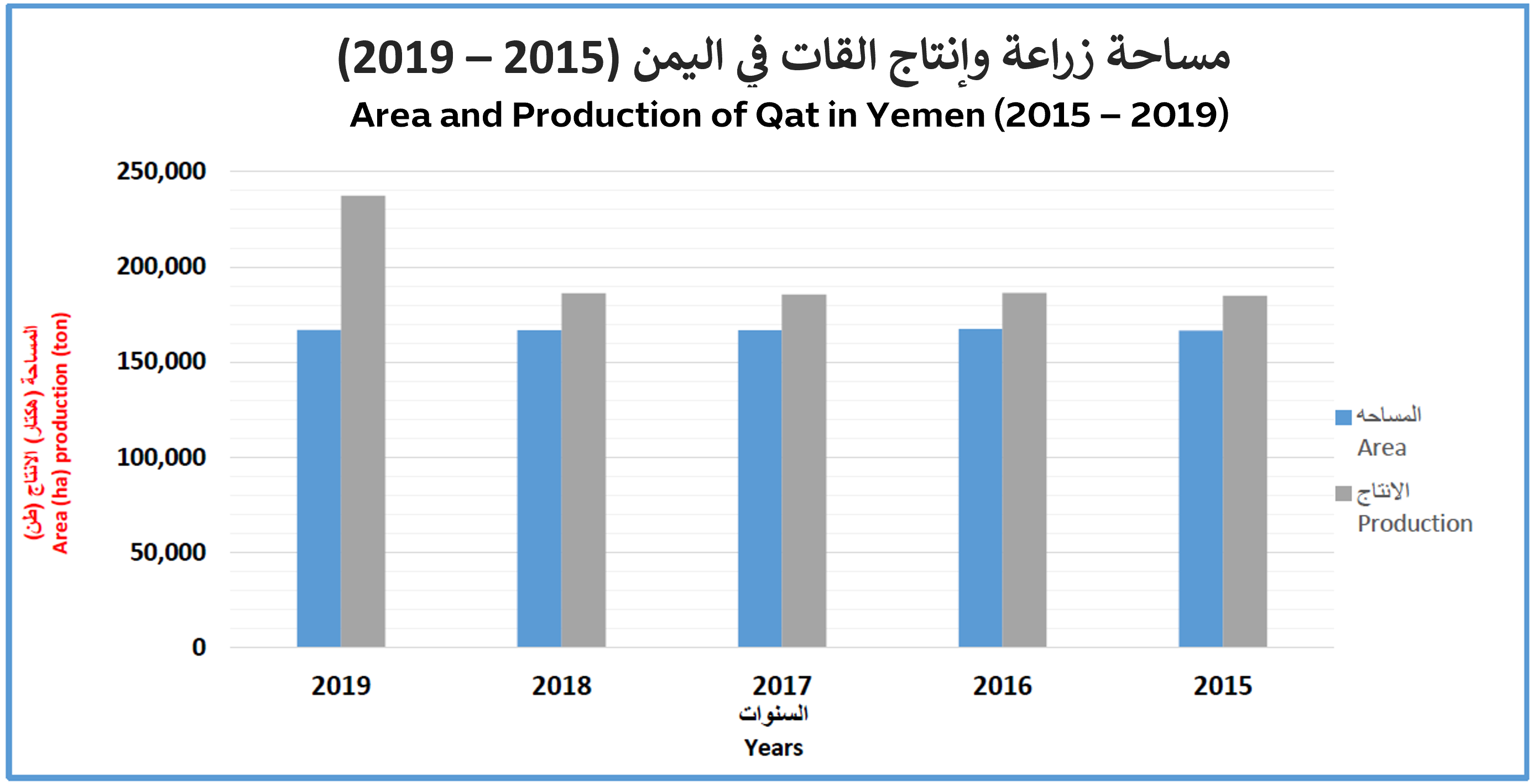
Pesticides: 80% Used on Qat
As reported by the Stockholm Convention Unit in the Yemeni Environmental Protection Authority, pesticides in Yemen are available everywhere, and they can be easily purchased at companies, suppliers, retailers, groceries and even street hawkers!
Being widely available, pesticides give farmers flexibility. However, it exacerbates major problems, such as commercial fraud, smuggling prohibited types of pesticides, and increasing misuse.
The increasing dependence on pesticides use on agricultural production in Yemen has negative effects on human and animal health, and the environment in general.
Recently, the excessive use of pesticides and chemical fertilizers has exacerbated many health risks to the population of the country.
According to specialists, pesticides in Yemen are mainly and intensively consumed on the Qat plant, then cucumbers and tomatoes rank second, and the rest of them are used on public health pests.
In an interview with “Holm Akhdar”, Prof. Abdul Rahman Thabet, the Professor of Pesticide Toxicology at Faculty of Agriculture, Sana’a University, says: “In Yemen, we import nearly 3 million liters/kg of pesticides annually. These pesticides have reached more than 1,200 commercial names traded in the local markets, and 80% of them are used on the qat tree, while 20% of them are directed to greenhouses for cucumbers cultivation”.
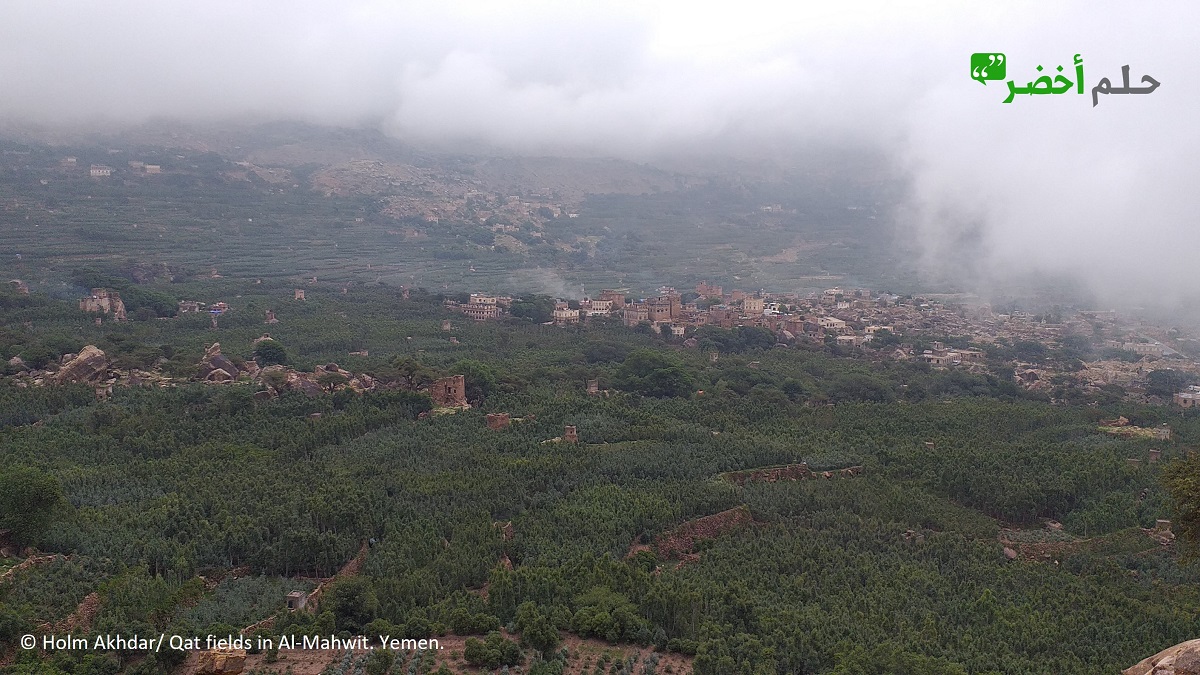
Chronic Toxicity of Pesticides
As for the agricultural crops in Yemen, they are seasonal crops that depend on rainfall, and no pesticides are used on them.
Prof. Abdul Rahman says: “We have risks called acute toxicity risks, which inflicts the consumer of a food crop, and the focus here is on the qat, for no other vegetable or fruit crops get excessively sprayed with pesticides as much as the qat; as about 80% of pesticides are used on the qat tree, so what happens to qat chewers at the beginning is called acute toxicity; i.e. when a person chews qat, he/she begins to feel a kind of nausea, blurred vision, colic, vomiting, and diarrhea as simple symptoms that last for 24 hours throughout the qat consumption session and then ends up. However, the more serious risk is called chronic toxicity, which occurs as a result of pesticides accumulated in the body throughout a period of (1-10) years. During this stage, diseases and fetus abnormalities begin to appear.”
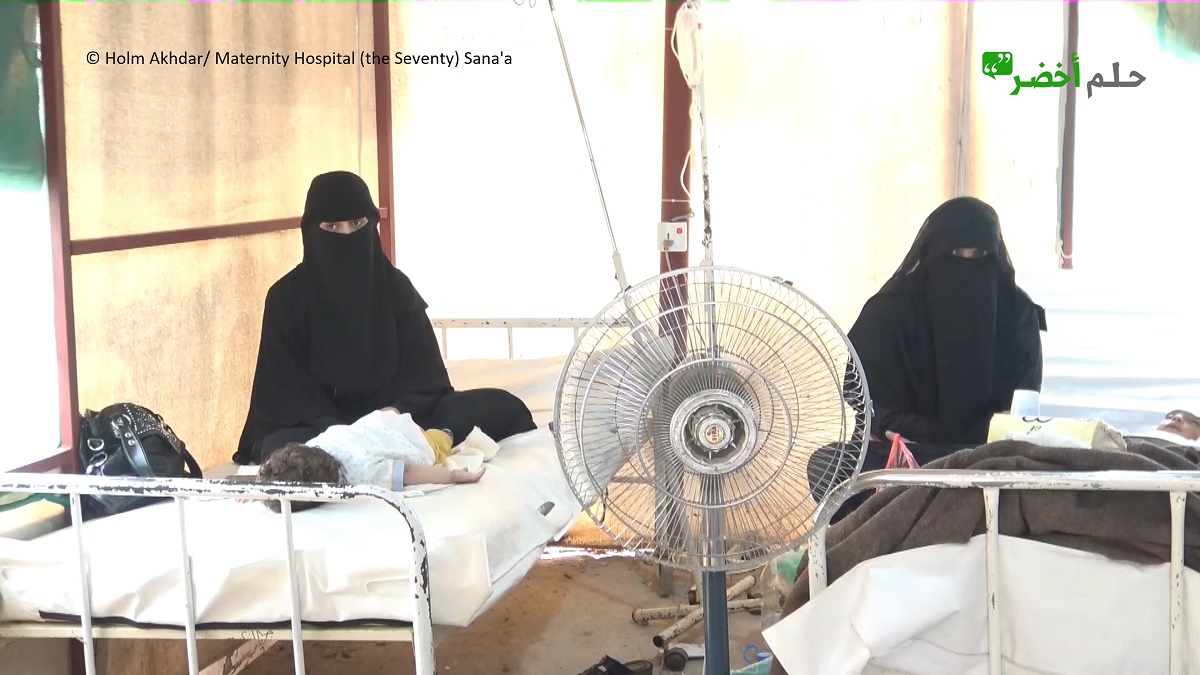
800 Cases of Fetus Abnormalities
In Yemen, pesticides cause deformities in fetuses during pregnancy (the first months of pregnancy), as the mother chews qat plant.
Prof. Abdul Rahman Thabet believes that pesticides risks greatly affects the health of pregnant women and newborns in Yemen, as demonstrated by one of the studies in which he participated 6 years ago.
“Scientifically, the toxic dose is calculated in milligram, a gram for every kilogram of human weight. For example, as the mother chews qat plant! she gets some colic, she weighs 70 kilograms, and the fetus weighs half a kilogram (1-2 kilograms in the last stages of pregnancy), and the fetus becomes at a greater risk of deformity in this stage.”
“Five years ago, we conducted a study at the (Al-Sabeeyn) Maternity Hospital in Sana’a, and we found terrifying fetal abnormalities in women chewing qat. The findings showed 800 cases of fetal abnormalities during pregnancy.” Prof. Abdul Rahman added.
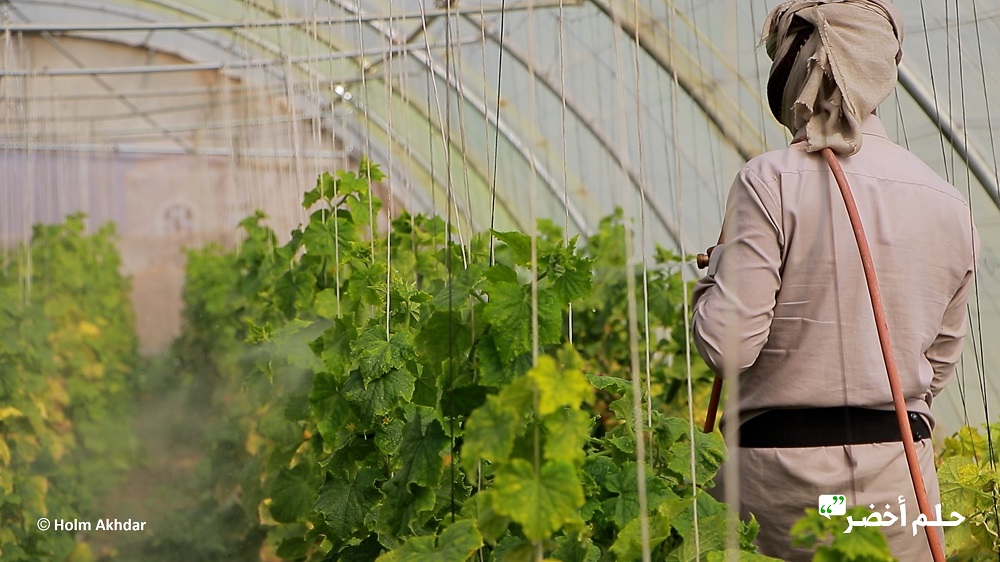
Cancerous Diseases Affecting Farmers
Farmers in Yemen use pesticides in wrong and indiscriminate ways, unaware of the pesticides’ serious harms on their health and the health of the consumers.
Prof. Abdel Rahman comments, “In Yemen, pesticides are used in wrong ways, in terms of application, first: Farmers don’t care about the pesticide spraying timing, or the kind of pests they are fighting! Sometimes, a farmer may spray pesticides against the wind, which blows it back towards him and his family. Thus, most farmers and their families are in very poor conditions”.
“At qat harvesting time, some hormonal substances are added to qat that cause the turmoil of vegetative growth, that’s why we find those substances are still active. According to international guidelines, in cold regions, you have to wait from 25 days to a month before reaping the crop. In hot areas, the period can be reduced to ensure the crop is not being subject to transpiration”.
“Field studies in Dhamar Governorate found that many farmers and their children are inflicted by cancerous diseases caused by wrong practices during spraying pesticides. In addition, farmers do not adhere to the safety period after spraying pesticides.” Prof. Abdul Rahman said.
Local farmers harvest crops like: qat, cucumber, tomato, 3-4 days after spraying pesticides. This increases health risks significantly.
The excessive use of pesticides and chemical fertilizers has exacerbated many health risks to people in Yemen. Farmers, here, use pesticides wrongly, and they trade prohibited and smuggled ones, unaware of their serious harms on their health & the health of consumers.#HolmAkhdar pic.twitter.com/dRxj1Kz6hr
— حلم أخضر Holm Akhdar (@holmakhdar) January 30, 2022
Prevalence of Oral and Rectal Cancers
Local studies found high level of concentration for pesticide residues in some crops, and showed how it’s closely related to the increase in cancer cases.
Prof. Abdul Rahman confirms, “Due to pesticides, oral cancer is widely prevalent among the elderly. Basically, when a person keeps chewing qat in parts of his mouth, the gums recede and rupture, and as the pesticide in the chewed qat gets adjacent to the wounds, these wounds absorb a considerable amount of pesticides daily.
“We have definite indications regarding the effects of the pesticides used on qat, such as oral, rectal, and liver cancers, which are mainly caused by the pesticides used on qat”, he added.
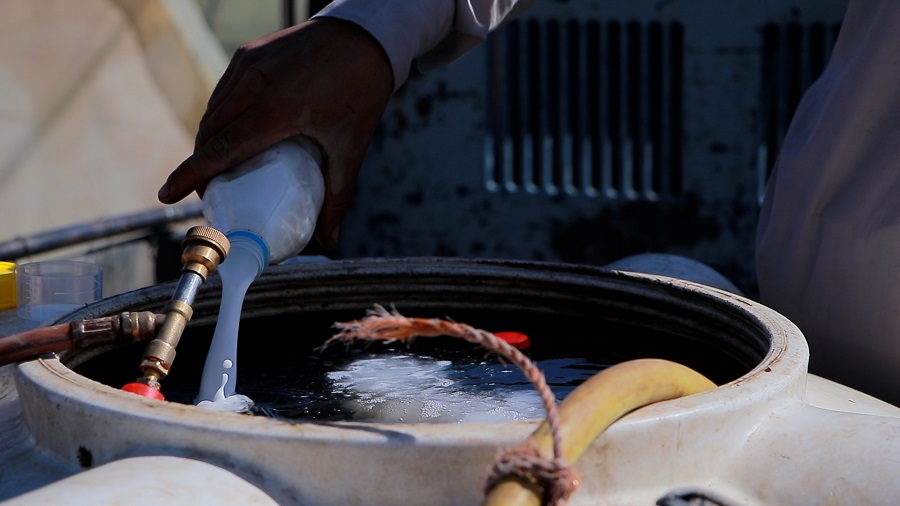
Laws and Legislations!
Yemen issued a number of laws and legislations related to plant protection, including Plant Quarantine Act No. 32 of 1999, Act No. 25 of 1999 regulating the trading of plant pesticides, and Act No. 7 of 2011 amending plant quarantine.
Act No. 26 of 1995 regarding environmental protection was also issued, which stipulates that “no pesticide should be used without a prior license, and that pesticide stores and warehouses should be far from residential neighborhoods. The circulation of toxic materials and hazardous waste is prohibited without prior official authorization.”
These legislations aimed to protect the environment and humans from chemical and toxic substances that may harm living organisms and human beings in the geographical environment.
Yemen has ratified a number of international treaties related to pesticides, including: The Rotterdam Convention (PIC) on the Application of the Prior Informed Consent Procedure for Chemicals and Pesticides in International Trade. In addition to the Basel Convention on the transboundary movement of hazardous wastes.
Yemen has also ratified the International Plant Protection Convention (IPPC) and the Stockholm Convention on Persistent Organic Pollutants (POPs), and the Montreal Protocol on Substances Penetrating the Ozone Layer.

Prohibited Pesticides and Conflict of Interests
In Yemen, the first official list of banned pesticides was issued in 2007. This list contained more than 900 commercial names that were banned from being traded in the country.
A document by the General Directorate of Plant Protection at the Ministry of Agriculture indicates that the list of banned pesticides in Yemen amounted to about 196 banned pesticides by 2017. While the severely restricted pesticides amounted to about 154 types.
Explaining to Holm Akhdar, Prof. Abdul Rahman said, “In 2007, the pesticide package consisted of one active substance, but today – unfortunately – about 3 active substances are found in one package, and most of them are prohibited ones. The catastrophe becomes worse when farmers mix two packages together”.
According to government reports, Yemen bans the use of chlorinated hydrocarbons manufactured in pesticides. Given the fact that using them as agricultural pesticides lead to human kidney failure and cancer diseases.
However, banned pesticides are smuggled into the Yemeni markets, and traded through pesticide stores. Meanwhile the main smugglers are outside the responsibility circle.
Recently, with the increase in pesticide smuggling crimes, the Ministry of Agriculture in Sana’a issued a ministerial decree No. 33 of 2018, regarding the blacklist of importers and traders of plant pesticides.

Pesticide Smuggling into Yemen
In 2009, a tainted shipment of sulfur pesticide was detained at Al-Wadea port, coming from Saudi Arabia, and turned out to be invalid for agricultural use. At that time, official documents revealed that the shipment belonged to the Bin Dughsan Corporation for Trade and Agricultural Services.
Five years later, specifically in July, 2013, that shipment was released by the (then) Minister of Agriculture and Irrigation, Farid Mujawar, by an official directive issued to the head of the tax authority to release that shipment.
Based on a previous report, on Nov 16, 2013, the Yemeni police found a huge amount of pesticides (about 3 tons) buried in a land in Al-Jeraf neighborhood, in Sana’a. They were toxic and extremely dangerous, the police stated.
Early February 2014, the local official media revealed that 18 of the key smugglers who involved in smuggling banned and internationally prohibited pesticides and toxins, entered the country illegally.
A report by the official daily (Al-Thawra) newspaper, citing an official report by the Ministry of Agriculture, indicated that the quantities of smuggled pesticides and highly hazardous substances that entered the country during the period (Mar 2012 to Mar 2013) amounted to about 61,221 kg/liter.
In light of all the above-mentioned facts, besides the poor control, poor law-enforcement, conflict of interests, and deteriorated health system in Yemen, these pesticides are increasingly hazardous to the public health of population, in a country suffering from a severe food crisis and experiencing an aggravating humanitarian crisis and bitter conflict.
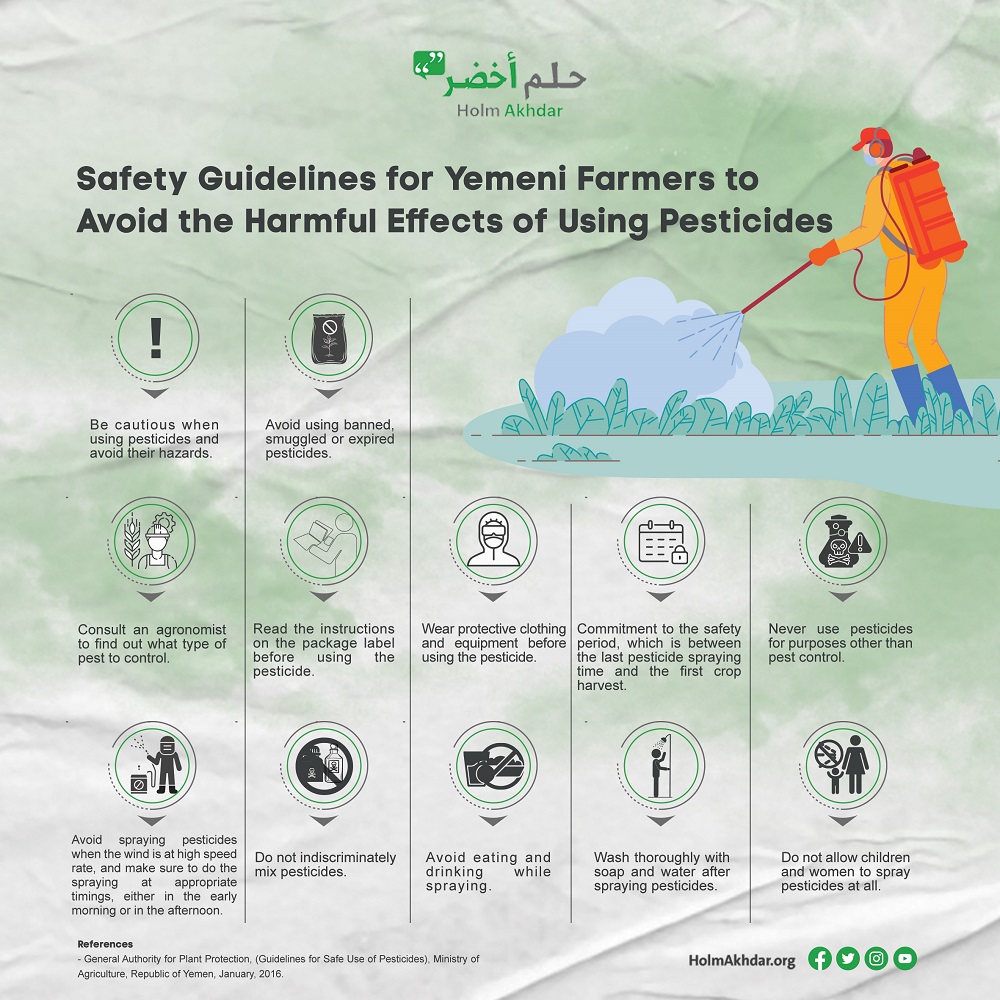
References:
– Stockholm Convention Unit Report on Persistent Organic Pollutants (POPS), Public Authority for Environmental Protection, Yemen, 2009.
– Many Authors, “The National Implementation Plan for Persistent Organic Pollutants”, Public Authority for Environmental Protection, Yemen 2008.
– Abdullah Hussein Al-Sayani, “A historical overview of the General Directorate of Plant Protection”, Ministry of Agriculture and Irrigation, Yemen, 2012.
– General Directorate for Plant Protection, “The List of Prohibited Pesticides in the Republic of Yemen”, Ministry of Agriculture. Yemen, 2017.
– General Directorate for Plant Protection, “List of Severely Restricted Pesticides in the Republic of Yemen”, Ministry of Agriculture. Yemen, 2017.
